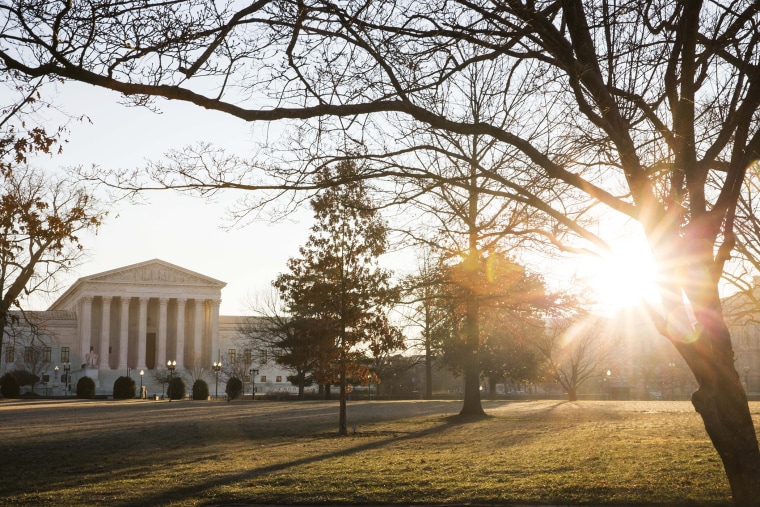When it struck down a key provision of the Voting Rights Act in 2013, the Supreme Court crippled one landmark civil rights law. Now it looks poised to go after another—making it harder to stop discrimination in a whole new sphere.
The justices will hear a case Wednesday giving them a chance to significantly narrow the scope of the Fair Housing Act (FHA), which bars governments, lenders, landlords, realtors, and anyone else from discriminating on the basis of race or other criteria in housing.
RELATED: Buying a home: The American dream that won't die
The FHA, passed in 1968 a week after the death of Martin Luther King Jr., isn’t lionized to the same degree as the Voting Rights Act or the Civil Rights Act. But, its supporters say, it’s an integral part of the panoply of civil rights legislation that transformed the country half a century ago.
“The stakes are very high,” said John Relman, a lawyer representing the National Fair Housing Alliance. “Housing lies at the fulcrum of civil rights. Where you live affects the opportunities you have for jobs, better schools, connections that allow you to have opportunity in your life to advance. And if we cannot use the FHA to address the policies that affect and limit where we live, then our ability to protect all these civil rights—employment rights, rights to a fair and equal education—will be seriously undermined.”
At issue in the case, Texas Department of Housing and Community Affairs v. The Inclusive Community Project, Inc., is whether the FHA bars actions that have a discriminatory effect—what’s known as disparate impact—or only those that are deliberately discriminatory. If the court were to rule that disparate impact claims aren’t covered under the FHA, it would badly weaken the law, because, these days, very few people blatantly advertise their racial prejudice, so proving intentional discrimination is extremely difficult.
Under disparate impact, plaintiffs have to do more than show that the actions they’re challenging had a harmful result on minorities. They also have to show that there was an alternative method that could have been used to achieve the same goal, with a less discriminatory result. That’s still a pretty high bar to meet, civil rights advocates say.
The Inclusive Community Project argues that Texas was approving tax credits for low-income housing only in heavily African-American neighborhoods of Dallas, and denying tax credits in white neighborhoods. That approach, they say, has prolonged the city’s racial segregation, making it harder for poor blacks to have a shot at upward mobility.
Texas has responded not by denying that it takes that approach but by arguing that since the discrimination isn’t intentional—it says it’s just trying to comply with federal mandates governing the use of tax credits—it’s not covered under the FHA. In its brief urging the Supreme Court to take the case, it noted that Congress included specific language in other laws—Title VII and the Age Discrimination in Employment Act—to show that it wanted to cover disparate impact. That language is missing from the FHA.
Still, disparate impact has been central to how the FHA has been used in the past to stop housing discrimination. For instance, in 2011, the lender Countrywide agreed to pay $335 million to settle allegations that it charged 200,000 minority borrowers more than white borrowers who posed the same credit risk. If the FHA hadn’t allowed disparate impact, the government would have had to find evidence of intentional racial bias in Countrywide’s lending policies, a high bar to meet. That would have made it far more difficult to hold Countrywide accountable.
RELATED: 2015's top SCOTUS cases
More broadly, civil rights advocates say the concept of disparate impact is a crucial piece of any effective modern-day approach to stopping discrimination.
“Congress recognized that segregation is not just out of intentional acts, but also the effects of long-term policies by government that had created two societies,” said Sherrilyn Ifill, the president of the NAACP Legal Defense Fund, which is helping to bring the case. “We need to be able to get our hands around what discrimination looks like outside of the context of individual bad actors.”
A district court and an appeals court—the conservative 5th Circuit—both ruled that the FHA does cover disparate impact. And every other appeals court that has ruled on the question, as well as almost every other district court, has come to the same conclusion.
So by taking the case at all, the Supreme Court signaled that it disagrees, and wants to take disparate impact out of the FHA. If it does so, the case would take its place next to Shelby County v. Holder, in which the justices neutered a key plank of the VRA, as part of the Roberts Court’s effort to pare back the anti-discrimination legislation of the civil rights era.
In fact, it looks like the court can hardly wait. In the last four years, it’s taken two other very similar cases, but last-minute settlements have prevented the justices from hearing them.
In at least one of those cases, Mount Holly Citizens in Action vs Township of Mount Holly, financial industry firms reportedly worked against a settlement, hoping to see disparate impact struck down, which would give them freer rein to discriminate.
“I don’t think we can kid ourselves that the court is not aggressively interested in this issue,” said Ifill.
Ifill pointed to the recent unrest in Ferguson, Missouri as a product of ongoing housing segregation. In response, she said, the Department of Housing and Urban Development issued strong guidelines on how to aggressively further fair housing policies under the FHA, including an affirmation of the role of disparate impact.
“So we are at a moment when the Fair Housing Act could really be robustly enforced in a way it never has in past,” Ifill said. “But it’s precisely the moment when it’s most in peril.”
